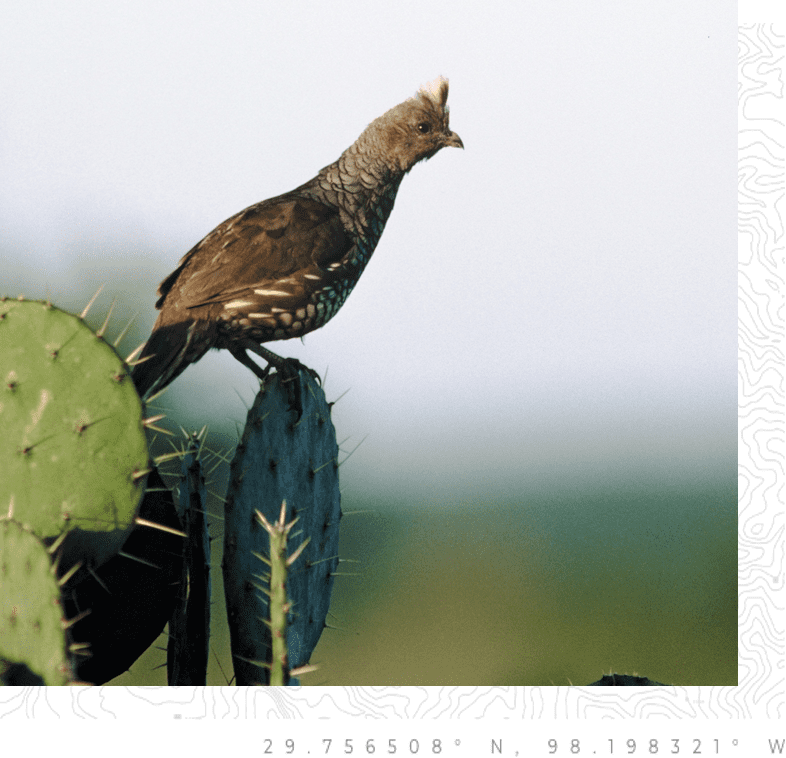Texas Wildlife Association Resolution Statement
Ensuring Sustainability of Public Values of Wildlife on Private Lands in Texas
WHEREAS, public values of wildlife on private lands in Texas make Texas’ wildlife resources relevant to our society; and
WHEREAS, public values of wildlife come in a variety of forms that benefit all Texans, be they direct or indirect, some with measurable qualities and some with immeasurable qualities, all of which are integral to the overall well-being of our society; and
WHEREAS, Real property rights are fundamental to the successes Texas has benefitted from, with respect to wildlife. Texas’ private landowners provide and care for habitat for the vast majority of wildlife in the state, and public values of wildlife resources provide real incentives for private landowners to invest in the stewardship of wildlife, and the protection of private property rights ensures that these stewardship practices are perpetuated; and
WHEREAS, public ownership of wildlife, which is legally rooted in a U.S. Supreme Court decision dating back to 1842, provides the most central and fundamental feature regarding public values of wildlife; and
WHEREAS, Texas’ diverse and abundant wildlife resources have shaped our state’s culture, our history and our heritage; and
WHEREAS, hunting has been integral in financing wildlife conservation and management in Texas for well over 100 years through license fees, excise taxes, funds raised by hunting/conservation groups, and financial benefits derived from hunters’ spending; and
WHEREAS, economies associated with wildlife-related activities help stabilize the entire Texas economy, directly and indirectly benefitting all Texans; and
WHEREAS, Texas citizens are increasingly removed from outdoor settings, rural affairs, and activities involving wildlife resources, resulting in agriculture and natural resource illiteracy; and
WHEREAS, agriculture and natural resource illiteracy affects a wide cross-section of Texas’ society, including the general public, as well as our elected and appointed officials; and
Now therefore, be it resolved, the Texas Wildlife Association (TWA), whose collective membership includes some 6,000 members, comprised of landowners, hunters, wildlife managers, wildlife enthusiasts, biologists, ranchers, and conservationists who own and control nearly 40 million acres of private land in Texas, recognizes the positive contributions the North American Wildlife Conservation Model (NAWCM) has made on wildlife conservation and we believe that the principles of this Model have helped shape the historical success of wildlife in Texas. We advocate that this Model be used as the guiding set of stewardship principles as we move into the future; and
Further, TWA recognizes the Public Trust Doctrine of Wildlife as the NAWCM’s foundation tenet. TWA supports wildlife as a public trust resource; and
Further, TWA believes that the Texas Parks and Wildlife Department (TPWD) should serve as the trustee of our state’s wildlife resources because it can most capably administer regulatory oversight of these publicly held resources; and
Further, TWA believes that all species of Texas wildlife should be managed in a manner that keeps Texas wildlife wild, while recognizing that landowners have the right and responsibility to make their own decisions along a reasonable management continuum, thus ensuring that the public values of these wildlife resources are sustained for the benefit of future generations; and
Further, TWA supports free-enterprise practices between landowners and public markets to incentivize stewardship of wildlife and habitat; and
Further, TWA believes that all wildlife in Texas must be managed in a manner that protects the health of any person who consumes meat products from these animals, and we oppose any practices that compromise public health, and we also believe that safeguards must be in place to prevent wildlife management practices that may put livestock at risk, or vice –versa, from potential disease transmission; and
Further, TWA believes that wildlife conservation education is imperative to deal with issues associated with natural resource and rural affairs illiteracy; and
Further, TWA believes that individual hunters have the right and responsibility to make their own decisions along a reasonable continuum of ethics, and the list below is intended to serve as a guide for ensuring fair ethical practices and standards:
We support fair-chase hunting. We recognize that there are many factors that incorporate a fair chase environment and define such practices as ethical and sportsmanlike, legal pursuit and taking of any wild game living in adequate native/naturalized habitat in a manner that does not give the hunter an improper or unfair advantage, and provides the hunted animals with a reasonable chance, opportunity and inclination to avoid being detected, and to have a reasonable opportunity to escape.
Hunters should obey game laws and regulations, as well as rules of the landowner on whose land they hunt.
Hunters should respect customs of the locale where their hunting takes place. Hunters should exercise a personal code of behavior that reflects favorably on one’s ability as a hunter.
Hunters should attain and maintain skills necessary to make the kill as certain, quick, and humane as possible.
Hunters should behave in a manner that does not dishonor the hunter, the quarry, or the heritage of hunting.
Hunters have a duty to promote, celebrate, and advocate on behalf of hunting in a manner that helps ensure sustainability of hunting.
Further, TWA believes that reasonable and responsible wildlife stewardship builds a strong platform for advocating private property rights, and we encourage wildlife management and hunting practices that find broad acceptance so as not to jeopardize the private property rights that are the key foundation to ensuring the sustainability of public values of wildlife on private lands in Texas.
Approved June 13, 2012



Comment